Updated on 27 October 2009
The World Federation Triennial Conference met in Toronto on 20 October 2009. With huge concern, uncertainty over the organisation’s future and with a seemingly impossible impasse the meeting began in earnest. This was a historic meeting, whereby the World Federation’s supreme body made a series of decisions which were difficult to make. In addition, reports were given from the Regions and World Federation departments and discussions on the progress of the community ensued.
Friday
The Triennial Conference for the term 2006-2009 opened with Du’a Wahda led by Sheikh Abbas Ismail, the Assistant Secretary General for Islamic Education followed by a spiritual and uplifting reflection of Suratul Furqan and Suratul Fajr. Sheikh Abbas Ismail then provided the Conference with a background on the Mixed Gatherings Guidelines which was adopted by all the Muballigheen retreat hosted by The World Federation in 2005.
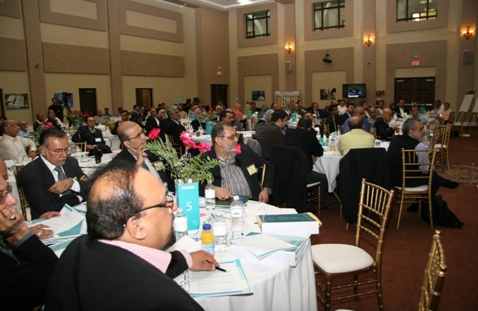
Br. Razak Damani, President of the Toronto Jamaat welcomed all delegates and guests and expressed his appreciation to The World Federation for holding the Triennial Conference 2009 in Toronto. He also thanked community members around the world for their support of the new Jaffari Islamic Centre. Finally, he thanked our forefathers for their sacrifices and trust which has allowed our centres to progress.
Dr Ahmed Hassam advised the conference that the World Federation does not have a President elect as yet, and stressed that this should be addressed as a serious matter by the conference. A motion was passed from the floor, which majority of the delegates voted in favour. This motion was to address the issues surrounding the elections as a priority over the existing agenda. A healthy and lengthy debate then took place.
There was a consensus amongst the delegates that the Standard Operating Procedures (SOP) was not followed. The august body noted a series of serious infringements of the SOP were highlighted, including the arbitration clauses that had not been followed since the Dubai Executive Council meeting.
The Conference discussed potential solutions. The President then proposed to appoint a 5-person committee to look at all the options discussed and to suggest the potential way forward. This group consisted of:
- Mujtaba Datoo
- Shabbir Najafi
- Hussein Walji
- Shabbar Dhalla
- Abbas Kanji
- Sadique Jaffer
The committee debated for a while, and thereafter presented 2 resolutions to the Conference to vote on, which would help address these electoral issues. The resolutions adopted by the house were as follows:
Resolution 1
This 2009 Triennial Conference (“Conference”) recognising the errors in the election process by, amongst others, the Executive Council and the Electoral Commissioner also recognising that the Electoral Comissioner at the commencement of the Conference did not submit his report to the Conference, and taking into account the sense of the Conference HEREBY RESOLVES that the tasks of the Electoral Commissioner are hereby absolved. This Conference also recommends that the next Executive Council undertake a study into the past election process (2009) and report within a year to the Executive Council.
Resolution 2
This 2009 Triennial Conference (“Conference”) bearing in mind the greater unity of the community, the potential disenfranchisement of some voters, recognising the need for succession and recognising that this episode is but a one time aberration in the growth and the promise of this community, and having considered several options as to courses of action, amongst the options which are:
• extend the term of the current 2006-2009 Office Bearers for an additional year; or
• elect caretaker committee for an additional year, at which time a new election would be conducted; or
• also having considered that this Conference has the penultimate authority to move with its own standard operating procedure and elect new Office Bearers.
Having considered the above options, the Conference HEREBY RESOLVES to adopt the course of reverting the authority back to the Conference and for the delegates to decide upon the next President from amongst those previously nominated.
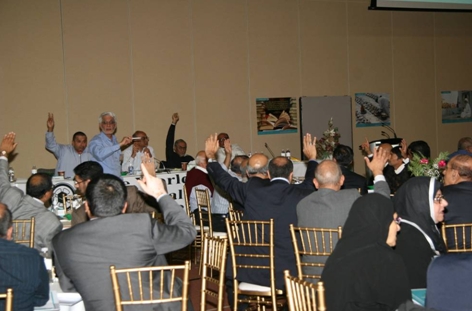
A debate took place during the process of these resolutions being proposed and the sense of the Conference was that an urgent solution was needed to stop this impasse. The Conference noted that these decisions were not easy and that the supreme body of The World Federation felt the need to make a decision that would bring progress to this community, especially since the Conference noted that the electoral process was fundamentally flawed.
KEY NOTE ADDRESSES BY REGIONAL LEADERS
NASIMCO
The President of NASIMCO, Gulamabbas Najafi acknowledged that for the first time the Triennial Conference was being held in North America. He expressed this gratitude to the Toronto Jamaat and its volunteers who have worked so hard to host this event. He noted that “action” is critical to the success of this conference. Finally he re-affirmed his commitment to capacity building and leadership development, expressing how he wanted to bring about positive changes to the lives of all brothers and sisters.
CoEJ
The President of CoEJ, Al Haj Munawer Rattansey, noted that this was his last speech as President of CoEJ. He reflected upon the development of CoEJ over the last 5 years, noting two of its major accomplishments which included uniting the Jamaats of Europe and becoming a member of The World Federation. Munawer Bhai thanked The World Federation for its support and positive relationship that the two organizations have developed during his term.
Dubai
Al Haj Azizbhai Jawad, the delegate from Dubai Jamaat informed the Conference about how the Dubai Jamaat is doing their best to cope with the growth of the community there. He also talked about how the community is promoting capacity building among the youth. He ended by inviting all delegates and invitees to visit to the Dubai Jamaat who is happy to welcome them all.
Africa Federation
Shabbirbhai Najafi, read the address from the Chairman of Africa Federation, Ramzanbhai Nanji, who expressed his apology for not being able to attend the conference due to visa issues.
KEY NOTE ADDRESS BY THE PRESIDENT
“It has been a tough day”, noted Dr. Ahmed Hassam, as he began his final speech as President of The World Federation. In his speech he thanked both NASIMCO and the Toronto Jamaat for extending their invitation to hold the Triennial Conference 2009 in Toronto. He expressed that the decision to hold the Conference in Toronto was not easy. Although Dubai was the first choice as the Conference venue, The World Federation did not receive the necessary permission to hold the conference there. He mentioned the wonderful opportunity delegates were given to visit the Toronto Jamaat’s new Centre. Whilst there were those who could not participate in the Conference due to visa issues, Dr. Hassam noted that the problem was mostly due to applicants not applying early enough.
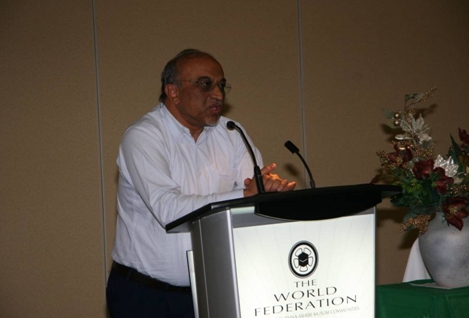
Moving on to reflect on his work over the last 6 years, Dr Hassam noted that within the first 2 years of his leadership, he was able to visit each and every region and Jamaat under The World Federation. This allowed him to see and understand the issues facing each of them and the difference The World Federation programmes were making. He thereafter talked about the 2 major achievements of the organisation during the term; Accreditation of an NGO status with the United Nations and the Muballigheen Training Programme’s accreditation of a Masters degree accredited by the University of Winchester.
Dr Hassam thanked donors for their support over the years, and stated that the work done would not have been possible without this support. He also mentioned that regular reports were sent to Ayatullah Seestani’s office, who appreciated and commended the work undertaken by our community. He then went on to thank his team, the regional federations, Jamaats and our community for their support during his time in office.
Following this, the delegates expressed their appreciation of Dr Hassam and the team’s work over the last 6 years.
The day included participation from two students of As-Sadiq Islamic School, Hussein Panju (age 8) and Muhammed Abbas (age 8). Hussein and Muhammed recited verses from the Holy Qur’an to begin the afternoon session. In appreciation of their participation, the President of NASIMCO, Gulamabbas Najafi, presented a cash gift to Hussein and Muhammed.
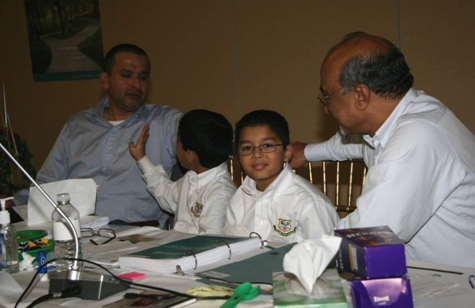
NASIMCO NIGHT
Friday night was a ‘NASIMCO night’, where delegates were had the opportunity to learn more about the activities of NASIMCO and its member organisations. An insight was given on inter-faith events, capital projects and how the centres in North America hold their religious programmes in their localities.
Saturday
Day two of the Triennial Conference for the term 2006-2009 commenced with the recitation of the Holy Qur’an by Br. Abbas, a youth from the Toronto Jamaat.
MINUTES AND MATTERS ARISING THERE-FROM
The minutes of the 2006 Triennial Conference were reviewed by the Conference. With no matters arising, the minutes were proposed by Murtaza Bhai Bharwani and seconded by Hussein Bhai Ismail.
PRESENTATION AND ADOPTION OF ACCOUNTS FOR THE YEARS 2006, 2007 AND 2008
Br. Ahmed Daya, Treasurer of The World Federation presented the organisation’s accounts to the Conference. Some of the highlights included:
• A financial glance 32 years on – since its formation in 1976, the community has received GBP £72,158,073 and has disbursed GBP £69,361,164 to date.
• Whilst Khums was once the main source of income at The World Federation, restricted and non-restricted funds are now the main source of income.
PAPERS FROM THE EXECUTIVE COUNCIL
A number of papers were shared as items for information. These papers had previously been submitted to the Executive Council over the term for approval and adoption. Some of these include Africa Eradication of Poverty, Disaster Relief, Water and Sanitation, Economic Upliftment Handbook, NGO Work Plan.
These papers have been developed to facilitate The World Federation’s new way of working since obtaining the NGO status.
REPORTS FROM THE REGIONAL FEDERATIONS:
(a) Karachi Pirhai Jamaat outlined some of its major projects for the coming year which include a census, sports and recreation complex, a family park, school extension for Early Childhood Education and vocational training for women. The Jamaat also raised an important dispute taking place with the Dubai Jamaat. Dr. Hassam noted that The World Federation is involved in resolving this dispute and that he was actively working with both of these communities to resolve the issues.
(b) Dubai Jamaat highlighted their progresses and issues they face as a community. This is the Dubai Jamaats’ last presence at a World Federation conference as a Regional Federation since it has not been able to unite with its sister Jamaat in Dubai to form a Regional organisation.
(c) CoEJ shared its history with the Conference, noting that over the past three years it had made significant progress in bringing awareness of CoEJ to the grassroots, establishing a secretariat office and enhancing teamwork among its staff and volunteers. CoEJ has focused its efforts on remaining a Regional Federation which adds value. A milestone in its history includes the review and improvements to its constitution.
(d) NASIMCO reviewed the work of its various departments: the Secretariat, Islamic Education, Family Affairs, Relief and Economic Upliftment, Education, ZCSS, Marketing and Capacity Building. In addition, a special presentation on its best practices was made by the Minnesota Jamaat.
Syed Muhammed Naqvi began the afternoon session, where he shared a reflection from the Holy Qur’an on the intellectual progression of the human being. When we stop growth from taking place, we stop something from reaching its full potential. He explained how to find relevance to those verses of the Qur’an that initially do not make sense to us.
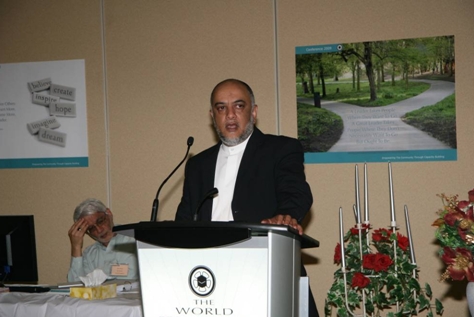
ELECTORAL COMMISSIONER’S REPORT ON THE 2009 PRESIDENTIAL ELECTION
The President of The World Federation, Dr. Ahmed Hassam read out an email to the Conference that he received from the former Electoral Commissioner declaring the results. This was only read as an item of information, since the electoral commissioner’s activities were absolved on the first day of the conference. Delegates deliberated on this, and since one of the arbitrators was present at the time, the delegates requested if he could present a report of his investigation.
Nazirbhai Jessa therefore reported to the Conference that he, with the help of Sajjadbhai Tejani had spent over 300 hours investigating the allegations put forth to the Arbitration Committee. He reported that they whilst none of the candidates participated in any wrong doings, significant voting irregularities had taken place in at least 7 jamaats in Gujarat. The Arbitration Committee had recommended a rerun of election in these seven cities, which include Bhavnagar, Ahmedabad and Mauva. This, again, was only presented as an item for information.
REPORTS FROM THE SECRETARIAT
The Secretary General, Yasinbhai Rahim acknowledged the hard work of the past Secretary Generals and noted that his work was built on that of his predecessors. He added that capacity building has always been a key component for this organisation, giving examples of how Mulla Asgharali recruited youth to take up key positions for the organization at the time. Yasin bhai also emphasised that this community demands the qualities of our youth and informed the conference that most of the secretariat reports would be presented by youth.
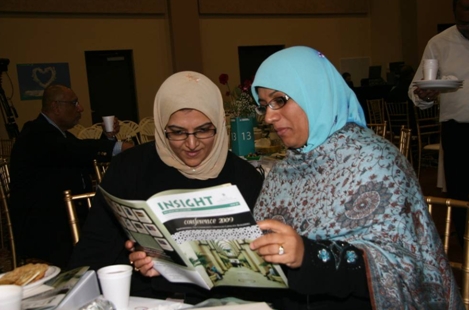
• Health – Dr. Munir Datoo spoke of the good working relationship Health has enjoyed with various Regional Federations this past term. As well, the Basra Eye Clinic was handed over to the people of Basra who will now own and manage this project. Sr. Sukaina Dada of Toronto shared her 6-week experience at The World Federation’s Autistic Day Care Centre in Dar-es-Salaam, Tanzania. She relayed that children with disabilities face considerable discrimination and that the programme at the school is individualized for each child. She witnessed a number of success stories and commented that programs taking place have the potential to grow because children there have the potential to grow.
• Marketing & Communications – Br. MohamedRiyaz Sachedina reviewed the achievements of the Communications Team and how this team was established over the last 6 years. Since coming into this position, he spoke about how the Leadership Development Programme has transformed him personally, at the community level and professionally. He thanked the Office Bearers for nurturing his growth at The World Federation and expressed his appreciation to the Secretariat and the Communications team for all of their hard work and support.
• ZCSS – Br. Sajjad Tejani informed the Conference that a total of 13,319 (sadaat and non-sadaat) students over 2,209 donors were being sponsored through ZCSS. He emphasized the need for the next team to focus ZCSS efforts now on higher education.
• Relief & Economic Development – Br. Shan-E-Abbas Hassam provided a brief overview of some of the achievements of this new team over the last three years. A new and more structured way of working had been created with agencies. He emphasized that the focus for the next term should be to create more microfinance projects to help uplift our community members economically.
• NGO Development – Br. Imran Janmohamed began by acknowledging the hard work of Shabirbhai Lakha for ensuring World Federation’s accreditation as an NGO with the United Nations. He reviewed the 4-stage process devised to maximize the benefits of this status. Since his appointment as NGO Manager, Br. Imran has attended various UN meetings to network with other individuals and organizations, and informed the conference of the benefits the organization has had through these meetings. In 2009, a 2-session seminar was held for the Executive Councillors to familiarize themselves with the NGO status and what it means for The World Federation. An NGO work plan was developed to take this initiative forward.
• Islamic Education – Sheikh Abbas Ismail pointed out that whilst the team was responsible for delivering 13 identified objectives, there were many new tasks beyond these that required attention, and that the team was dynamic and flexible to meet these demands. Sheikh Abbas outlined the main areas of activity for Islamic Education, which includes External Tableegh, Internal Tableegh, Islamic Religious Education and Publications.
OPENING OF MULLA ASGHARALI MEMORIAL LIBRARY AND RESOURCE CENTRE
Saturday night was a historic moment for the delegates and all those present. It was the opening of Mulla Asgharali Memorial Library and Resource Centre, which is located within Jaffari Islamic Centre. Leaders of the community paid tribute to this unique personality, who has made significant contributions towards Tableegh efforts and the spiritual upliftment.
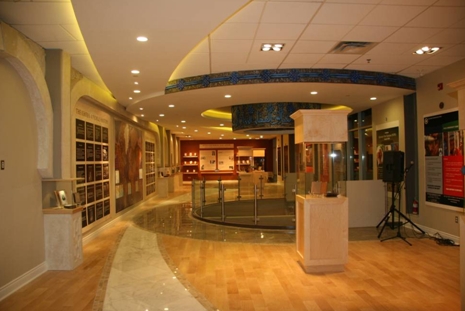
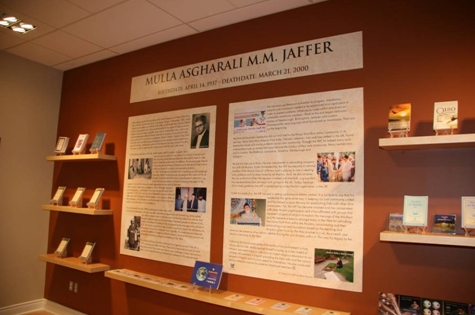
Sunday
Day 3 of the conference began with the recitation of the Holy Qur’an by a Toronto student, Zishan Janmohamed. A short presentation on enhancing capacity building among volunteers was given by Shabbar Dhalla, who showed a clip on the 2009 CoEJ Boys Summer Camp. The capacity building report was presented by Dr. Akber Mohamedali.
The august body continued to listen and discuss the Secretariat reports.
• Education – Yasin bhai presented this report on behalf of Br. Mahmood Dhalla, who could not make it to the conference and had sent his apologies. This report included information on how this term has been able to receive repayments of higher education loans taken several years ago.
SECRETARY GENERAL’S REPORT
Yasinbhai Rahim outlined that his role as Secretary General was to ‘create space where volunteers could come and paint on a canvas’. Yasin Bhai outlined two dangers facing our community; namely, the danger of not letting go and the danger of futility. He recognized and thanked the efforts of all of the Assistant Secretary Generals, the staff and volunteers for their hard work and commitment over the past term. He also thanked each of the Office Bearers for their encouragement and guidance during his term. Finally, he extended his gratitude to his family for their support.
ASSET REALIZATION UPDATE
Dr Hassam explained the importance of analyzing the net worth of our community institution’s assets around the world so that we can maximize our returns from these assets. As a result, Shabbar Bhai Dhalla reported on behalf of CoEJ and NASIMCO that they had collected data from around the world; from Africa Federation, CoEJ and NASIMCO. Whilst not all of the data required was received, the minimum net worth of our collective jamaats is USD $77.5 million dollars. He recommended that the rest of the data be collected so to ascertain the community’s actual net worth.
STRATEGIC PLAN UPDATE
In 2003, Br. Abbas Kanji was entrusted with continuing his work of carrying out a study of the strategic planning process commissioned by The World Federation. In July 2009, he conducted another survey of the activities of The World Federation where frank and honest feedback was received by Office Bearers of The World Federation, regional federations, Assistant Secretary Generals and staff. Data was gathered through desktop reviews, online surveys, in person and phone interviews. Br. Abbas shared his findings with the Conference as they related to each areas of work. In addition, he outlined some of the challenges and recommendations as a result of the survey data obtained. A key recommendation made was the need for the community to put personal differences aside, and to focus on the bigger picture and work as a united team in delivering outputs that would take this community forward.
RESOLUTIONS BY NASIMCO
The conference deliberated on the proposal by NASIMCO to amend the constitution as follows:
Amend Clause 3.1 of the constitution by substituting the number of years from “Six” to “Seven”.
Shia Ithna-Asheri Federations of Jamaats, Communities or Organisations established in such geographical regions as may be feasible and agreed by the Executive Council shall be eligible for a single membership of the Federation. Where no Regional Federation exists, the current individual member Jamaats shall form such a Regional Federation and apply for membership of the Federation no later than six years from this change in the Constitution. In the event one or more current individual member Jamaat shall not join a Regional Federation, they shall become Associate Members of the Federation with no voting rights. In a region where no Regional Federation is constituted nor applied for membership no later than six years from the date of this change, then all individual member Jamaats in that region shall become Associate Members with no voting rights. Other than the current individual member Jamaats no such individual Jamaat, Community or Organisation be eligible to apply for membership of the Federation.
Following deliberations, this resolution was unanimously passed by the conference.
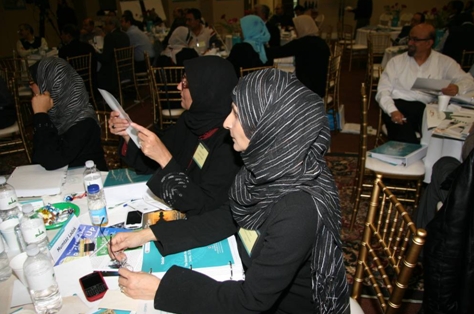
NASIMCO’s next proposal was to amend the electoral process:
It is hereby resolved that a constitutional conference be convened in December 2010 In UK to amend the WF presidential election method, process and specifically to substitute it with the following guidelines... Click here to read this resolution further.
Following discussions the following amendment was passed by the conference:
It is hereby resolved that a constitutional conference be convened in December 2010 In UK to amend the WF presidential election method and process.
Ashikbhai Rashid then gave a statement, where he raised his concerns surrounding the deliberations and resolutions passed by the conference on Friday. He stated that the resolutions passed on Friday were premature, since the electoral commissioner’s declaration was made in time prior to his agenda item. This was acknowledged as an item for information.
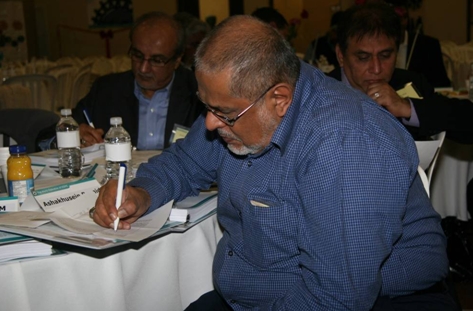
ELECTIONS
The election process then began, with the following resolution being unanimously passed by the conference:-
The Electoral Commissioner be elected to complete the current term for 2006-2009.
Brother Mujtaba Datoo was unanimously elected by the conference as the Electoral Commissioner to complete the term 2006-2009.
He mentioned the positions of elections that were to take place; President, Vice President, Treasurer, 5 Executive Councillors and Electoral Commissioner. He reiterated that the position of the President is only restricted to the 6 candidates who contested the election as per the resolution that was passed on Friday.
Election for the post of President
The following names were proposed for this position:
Dr Amir Lakha (withdrew)
Br Aunali Khalfan
Dr Asgharali Moledina
Br Ashik Rashid (withdrew)
Br Munawer Rattansey (withdrew)
An election thereafter took place by secret ballot, between Dr Asgharali Moledina and Aunali Khalfan. Having received majority of the votes, the electoral commissioner declared Dr Asgharali Moledina as the President of The World Federation for the term 2009-2012.
Election for the post of Vice President
Munawarbhai Rattansey was nominated for the position of Vice President. Since there were no other nominations, the electoral commissioner declared Munawar Rattansey as the Vice President of The World Federation for the term 2009-2012.
Election for the post of Hon. Treasurer
The election of the Hon. Treasurer then took place. Sajjad Tejani was proposed and since there were no other nominations, the electoral commissioner declared Sajjad Tejani as the Hon. Treasurer of The World Federation for the term 2009-2012.
Office Bearers for the term 2009-2012
The new Office Bearers for The World Federation for the term 2009-2012 are:
President – Dr Asgharali Moledina
Vice President – Munawer Rattansey
Secretary General – Shabbar Dhalla
Hon. Treasurer – Sajjad Tejani
Executive Councillors for the term 2009-2012
Conference nominated 10 individuals to the post of Executive Councillor:
1. Ali Hemani
2. Kamruddin Khaki
3. Syed Mohamed Naqvi
4. Dr Mohsin Jaffer [Elected]
5. Murtaza Bharwani
6. Riaz Jiraj
7. Saeeda Jiwa [Elected]
8. Shabir Karim [Elected]
9. Shabir Najafi [Elected]
10. Shan E Abbas Hassam [Elected]
Auditors
Hays Macintyre were appointed as auditors for the term 2009-2012.
Electoral Commissioner
Jaffer bhai Dharamsi was unanimously elected as the Electoral Commissioner for the term 2009-2012.
QUESTIONS FROM THE COMMUNITY
Delegates discussed and provided feedback on the following questions:
1. How does The World Federation plan for our community to be financially self sufficient, putting the day of ‘hat in hand’ behind us when we need to fundraise (e.g. to build a community centre or fund a project in the third world)?
2. To maintain unity and effective resolution of disagreements within Jamaats, what specific role can the regional body and/or The World Federation provide for effective and timely resolution?
3. How can individual members address concerns, if not resolved by the local Jamaat Management, to the regional bodies (e.g. NASIMCO) to avoid seeking help from outside the community?
4. How should The World Federation work with independent organisations?
MUBALLIGHEEN TRAINING PROGRAMME
Jaffer Bhai Dharamsi gave an update, where he reminded the conference on how this programme was started and progress since, from the Muballigheen retreat in 2005 to Dubai Conference in 2006, to the accreditation of its programme by Winchester University. Jaffer bhai highlighted some of the following as key achievements of the institute over the last 3 years since its inception:
- Appointment of the Dean, Dr Mahmood Abdulla.
- Appointment of an Eastern Programme leader, Sheikh Muhammad Khalfan and a Western Programme leader, Dr Mahmood Datoo.
- Assessment by independent Muballigheen of our community, who reviewed the curriculum and assessed the students, commending this program with some items for recommendation.
- Recognition and support by Ayatullah Seestani, with regular updates provided to him in Najaf.
Jafferbhai talked about the lack of support from the leadership of the community in actively promoting and looking for young students to enrol on this programme. He also highlighted the lack of communication and response he receives from the councillors and leaders of the community.
Jaffer bhai thanked the 86 volunteers around the world who assist in co-ordinating the activities of the Muballigheen Training Programme (MTP). Going forward, Jaffer bhai proposed the following points that may be considered:
1) Allow students that meet the criteria, to participate just in the first year IIPS course.
2) Organise Summer Courses at the Institute in Damascus for post A Level students.
3) Offer one year gap diploma course at the Institute in Damascus.
A discussion followed amongst the councillors, where thoughts were shared by councillors on the way forward. One of the proposals was around flexing the entry requirements. Dr Hassam emphasised on the need to form a solid governance structure for the institute, so that day-to-day decisions are made by relevant professionals, and asked the new office bearers to look into this task seriously.
KEYNOTE SPEECH BY PRESIDENT ELECT
Dr. Asghar Moledina, President Elect of The World Federation expressed his gratitude to all the Conference participants for chartering a course to resolve the issues surrounding the Presidential elections. Whilst this has been a turbulent time, he stated that the guiding light has been to serve Islam and the community for the pleasure of the Almighty. He assured the Conference and the community that the new team will listen to the concerns, complaints and suggestions of the grassroots. He urged individuals around the world to share their concerns directly with the Office Bearers and to avoid any back hall talk. The focus of this new team will be the entire Khoja Shia Muslim community around the world. He provided the delegates with a flavour of his plan for the community, and gave his commitment to look into the needs of all our communities, including the small jamaats. He thereafter talked about the madaris and matrimonial issues facing our community. He also pledged to create a data bank, with all data legislations in mind, that would effectively facilitate for marriages, He pledged that continuity will remain, and prime projects such as the NGO and MTP will remain. He thereafter thanked Dr Hassam and his team for their efforts and asked for their guidance and support in this path.
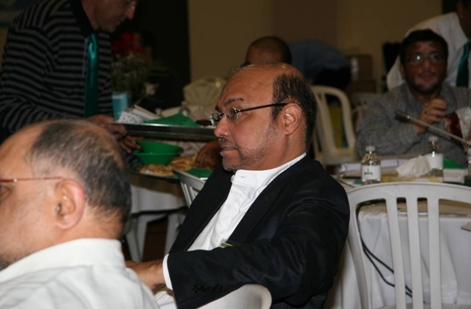
Dr Hassam pledged his support and presented Dr Moledina with a ‘handover file’ that contains information on the work undertaken by the team, and recommendations on the way forward.
Dr Moledina thanked Yasin Rahim for creating a youthful community through his capacity building programme.
CAPITAL PROJECTS PAPER
The Capital Projects Paper was adopted in 2007, at which time a sunset clause was introduced which ends today. 90 days prior to the Triennial Conference 2009, all regions were contacted asking for their feedback on the paper. CoEJ and NASIMCO signed off the paper. Dr. Hassam proposed to adopt the Capital Projects Paper. The house agreed and the paper was adopted. Click here [link to paper] to read this paper.
UPDATE ON THE FORMATION OF REGIONAL BODIES
Dr. Hassam reported that no feedback on the formation of regional bodies has been received from Australia. Pakistan has already formed a Regional Federation and has completed an application form for acceptance. Dr. Hassam asked if the Dubai Jamaat could become a one-Jamaat regional body as there is no other Jamaat there to unite with. Aziz Bhai Jawad of Dubai Jamaat confirmed this challenge which they were facing. The conference debated this issue, Shabbar Dhalla, Habib M Habib and Shan-E-Abbas Hassam suggested that the constitution only required regional federations to be created where ‘feasible’. Dr Hassam then asked Aziz bhai to discuss this further with Dubai Jamaat and to get their input on this.
BUDGET 2010-2012
The 2010 – 2012 budget was proposed and passed by the Conference.
The conference ended with a Dua from Sheikh Mustafa Jaffer.
Dr Hussein Jiwa, CoEJ President Elect said: “The conference in essence has shown the true spirit of unity and brotherhood. I am pleased that we reached consensus amicably at a critical time and steered our community back on track”.
Br Mujtaba Datoo said: “This conference has provided procedural challenges to the electoral process. Such critical junctures also avail the communities an opportunity to dig deep into its soul as to what is the spirit and best interest of the communities world-wide. The conference allows us to take stock of how far we have come, lessons learnt and how we move forward. The future of our community is promising, given the vitality and dynamism of all our members globally”.
Br Shabbir Najafi had the following to say: “The conference was conducted in a professional manner, ensuring all procedures and processes were followed and adhered to. It was heartening to see our leaders put their personal differences aside and the unity of our community at the fore-front to make decisions that will inshAllah take our community forward”.
For any queries or further information on the WF Triennial Conference 2009, please email secretariat@world-federation.org